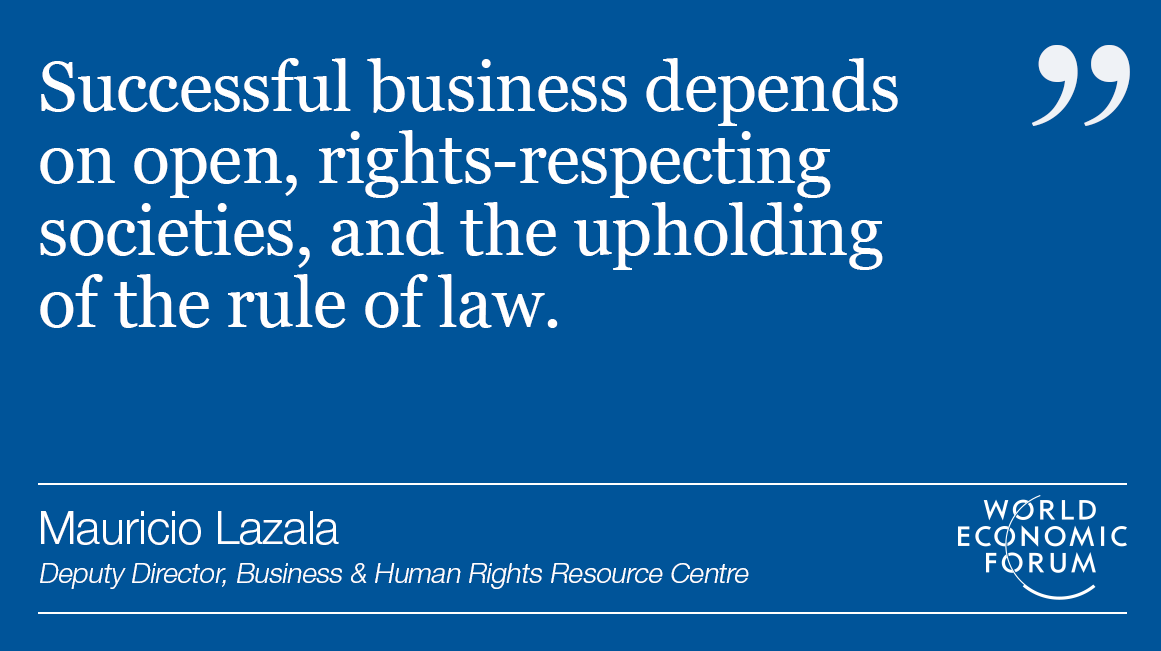Civil rights are under attack. Here’s why the business world should care

The business world should be worried about challenges to civil rights
Image: REUTERS/Ivan Alvarado
Stay up to date:
Latin America
In many countries around the world, civic freedoms have been shrinking: laws to stifle dissent have been passed, rising populism has stirred xenophobia, and those who dare to speak truth to power have faced intimidation and even violence.
Research by CIVICUS shows that 3.2 billion people now live in countries where civic space is either repressed or closed, and the warning signs suggest things are getting worse rather than better.
How does this affect business, and what role has – and should – the business world play?
While many of these increasing restrictions come from governments, in some cases the business world is guilty of helping erode the civic space.
Last month, we made public a database tracking instances where human rights defenders working on corporate accountability issues have been attacked. For the two years covered – 2015 and 2016 – we found over 450 instances around the world.
The top six countries where these attacks occurred are all in Latin America.

In some countries, companies have quietly lobbied governments to pass legislation to limit the ability of NGOs to monitor and raise questions about projects affecting their livelihoods.
There has also been extensive use of legal systems to criminalize the legitimate work of human rights defenders, stop their funding and persecute them as “terrorists”, “traitors”, “anti-development”, or economic saboteurs. In Chile, Mapuche indigenous activists protesting forestry companies have had anti-terrorism legislation used against them. In other countries, some companies have filed defamation lawsuits against critics with the aim of silencing them.
These businesses are exposing themselves to substantial risks and are on the wrong side of history. Survey after survey has shown that customers want to purchase from companies committed to ethics and social values. Businesses engaging in these sorts of activities are trading short-terms gains for long-term losses.
In fact, there is a strong business case for supporting a healthy and vibrant civic environment.
For one thing, both civil society and business need the same sort of environment in which to thrive. Successful business depends on open, rights-respecting societies, and the upholding of the rule of law. So do successful civil society organizations. Critical thought, creativity and innovation are crucial for business, and deteriorate where civic space is restricted. Civil society requires firm respect for freedom of expression and association, and free access to remedy and redress mechanisms to conduct its work, and so does business. Political and economic volatility is bad for both. A corrupt political system and judiciary, and hefty obstacles to registration, operation and funding, are harmful for both business and civil society.

Perhaps more research is needed to conclusively demonstrate a strong match between the factors that encourage open, tolerant and transparent societies, and those that boost environments for business investment and growth. However, if we examine country ranks on the Ease of Doing Business index and the Best Countries for Business index on one hand, and the Human Development Index (HDI) and the Freedom in the World index on the other, we find a strong correlation of countries at the top, and at the bottom, in both sets of indices. This should at least be strong empirical evidence that having a prosperous economy in which business thrives is compatible with having high levels of freedom, openness and respect for all human rights.
There are other ways in which business can benefit from a strong civil society.
For example, defending human rights and helping reduce social unrest increases acceptance of investments and business operations, helps companies secure a social license to operate, and lowers the cost of capital. How so? Because research suggests civic freedoms reduce corruption, which reduces the cost of doing business. In addition, civil society representatives play a monitoring and reporting role that is useful for business, as they deal with those market failures that are too grave to be fixed by competition and commerce alone.
Socially responsible companies are also more widely regarded by both customers and employees, giving them a competitive edge over laggard companies. Those poor performers that choose to ignore or undermine civil society run the risk of reputational harm, brand damage, shareholder divestment, withdrawn financing, expensive litigation and significant unplanned operational costs. One study found that a major, world-class mining project will suffer costs of roughly $20 million per week of delayed production in case of conflicts with communities.
Luckily, there are companies that understand they can play a positive role in protecting civic activists and civic freedoms – and several of them are doing so.
We have seen public statements of support by Tiffany & Co. and S-Group on behalf of human rights defenders in Angola and Thailand. We have seen global garment brands collaborating to protect striking workers in Cambodia. We have seen hundreds of companies speaking out against Donald Trump’s travel bans. We have seen five IT companies publicly commit to ignore a tender by Pakistan to censor the internet. We saw Microsoft taking the US Government to court for the right to tell its customers when a federal agency is looking at their emails.
The UN Global Compact provides numerous examples of other companies supporting the rule of law in diverse ways, on a sector-by-sector basis. In all these cases, company intervention has had a significant, positive impact.
What these companies realize is that they cannot, and do not want to, ignore the dismantling of civic freedoms in many parts of the world, both for self-interest and moral reasons. Other businesses would do well to follow their example. 2016 marked the 11th consecutive year of decline in global freedom and too many companies are still responsible or complicit in abuses of civic activists. Companies taking more frequent actions speaking up in defense of civic freedoms and human rights will be rewarded by their stakeholders and will gain significant long-term economic benefits.
Don't miss any update on this topic
Create a free account and access your personalized content collection with our latest publications and analyses.
License and Republishing
World Economic Forum articles may be republished in accordance with the Creative Commons Attribution-NonCommercial-NoDerivatives 4.0 International Public License, and in accordance with our Terms of Use.
The views expressed in this article are those of the author alone and not the World Economic Forum.
Forum Stories newsletter
Bringing you weekly curated insights and analysis on the global issues that matter.
More on Civil SocietySee all
Shaun Seow and Varad Pande
November 4, 2025
David Ebube Nwachukwu and Adam Skali
August 25, 2025
Thom Townsend
August 20, 2025
Valeriya Ionan
July 28, 2025
Annette Mosman
June 19, 2025






